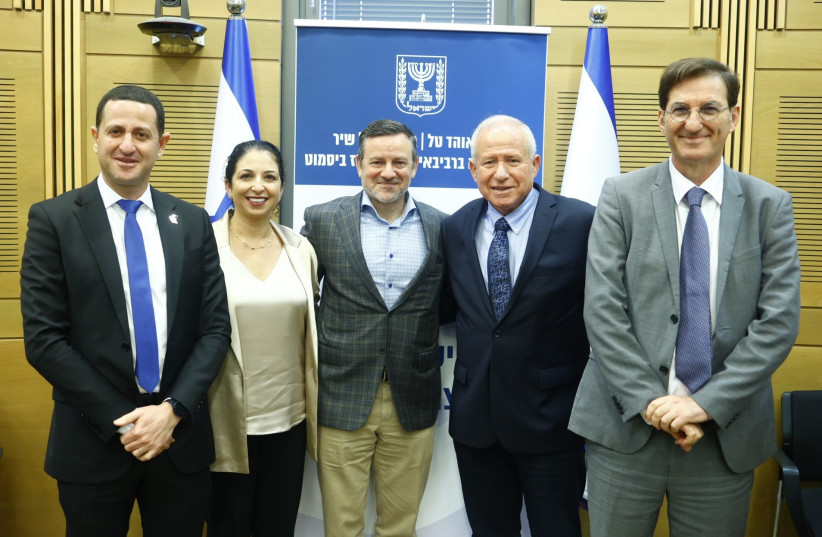Israel targeted 111x more than North Korea in Human Rights tweets
In a troubling new study, it was found that “Israel was mentioned approximately 10 times more than any other country in tweets pertaining to human rights violations.”
This disturbing trend reveals a deep-seated double standard against the country, perpetuating a disproportionate focus in social media discussions. According to the study, Israel is mentioned 12 times more than China on issues of violating human rights; 38 times more than Iran, 55 more times than Iran and 111 more times than North Korea.
The groundbreaking study, a collaboration between the Ruderman Family Foundation and the Network Contagion Research Institute (NCRI), reveals the chilling echo of these harmful narratives across millions of tweets and their impact on society.
The report was unveiled during today’s Knesset Caucus for Israel-American Jewry Relations. The caucus is headed by four MKs: Ohad Tal (Religious Zionism Party), MK Boaz Bismuth (Likud) , MK Orna Barbivai (Yesh Atid) and Michal Shir Segman (Yesh Atid).
The study, analyzing close to 100 million tweets from January 1, 2020, to June 30, 2022, demonstrates the shifting popularity of antisemitic and anti-Zionist narratives on Twitter, particularly in response to real-world events. “This ‘pendulum’ effect highlights how political circumstances or changes in leadership, as well as conflicts and domestic unrest, can influence which narrative is favored,” the report states.
“We have identified a clear correlation between social media discourse and its influence in the real world,” said Shira Ruderman, Executive Director of the Ruderman Family Foundation. “The fact that Israel is measured differently from other countries in the world, using a double standard, is alarming. This issue crosses political lines and worldviews and is an opportunity for elected officials, from all sides of the political spectrum, to denounce this disturbing phenomenon.”
 MK Ohad Tal, RFF Executive Director Shira Ruderman, RFF President Jay Ruderman, MK Avi Dichter and MK Boaz Bismuth attend the Knesset Caucus for Israel-American Jewry Relations (credit: DOR SITHAKOL)
MK Ohad Tal, RFF Executive Director Shira Ruderman, RFF President Jay Ruderman, MK Avi Dichter and MK Boaz Bismuth attend the Knesset Caucus for Israel-American Jewry Relations (credit: DOR SITHAKOL)Significant findings from the study
The themes of antisemitic and anti-Zionist narratives are nearly identical, focusing on bloodlust, dominance, covert control, and replacement, revealing an unsettling connection between the two types of discourse.
A marked double standard against Israel is prevalent on Twitter, with human rights terms disproportionately targeting the country, further fueling anti-Zionist narratives that mirror traditional antisemitic tropes.The discourse on Twitter correlates strongly with real-world antisemitic incidents, suggesting that social media plays a significant role in amplifying these harmful narratives.
Adam Sohn, CEO of the NCRI, emphasized the worrying overlap between anti-Zionism and antisemitism. “Many people distinguish between the two, but our research suggests the tropes they use are nearly identical,” Sohn said.
“We found this to be true in our current as well as previous analyses, where there was a strong correlation with real-world antisemitic incidents. The tropes of anti-Zionism are used to justify a larger attack against Jews everywhere, and we urge proper measures to be taken against it.”
The report also highlighted alarming trends in the use of these tropes during key moments:
Under right-leaning U.S. leadership (January 1, 2020 – January 20, 2021), there were six times more tweets with antisemitic tropes than anti-Zionist ones per day.
Under left-leaning U.S. leadership (January 20, 2021 – June 30, 2022), tweets with anti-Zionist tropes outnumbered antisemitic ones by approximately three times per day.
Peaks of antisemitic tropes coincided with Covid-19 conspiracies, the January 6 events at the U.S. Capitol, and other key moments.
Anti-Zionist tropes saw significant increases during the Israel-Gaza conflict (May 2021), the release of Amnesty International’s February 2022 report, and other significant events.
Following the revelations, the Ruderman Family Foundation and NCRI plan to continue researching these harmful narratives and their societal impact. Their aim is to explore potential strategies for mitigating this troubling trend and ensure that public discourse remains free from prejudice and hate.
“This study is a call to action,” Ruderman said. “It’s crucial for us to understand antisemitism and its impact on the global Jewish community, as well as on Israel-American Jewry relations. Our research will continue, with the hope that it provides the data needed for thought leaders and decision-makers to take the necessary steps against such disturbing trends.”
The Knesset Caucus for Strengthening Israel-US Jewry Relations became a heated argument between two MKs on Wednesday, instead of it being an event promoting unity, as it was meant to be. MK Bismuth spoke at the event, but decided to relate to political issues, concerning American and Israeli politics. MK Barbivai was outraged by the way Bismuth spoke, read a statement from a piece of paper and left the caucus dramatically.
“Member of Knesset Bismuth to take the discussion to a political place. You took a political discourse that we all have a lot to say about, and put it at the forefront of this discussion. “I thought I had reached a different discussion, about Israel’s relations with American Jewry,” Barbivai stated. “The problem is that the political discussion sabotages the fact that we can be Jews everywhere in the world; to be a model state. Bismuth, you preferred your personal interest to the eradication of antisemitism around the world,” she said.





Comments are closed.